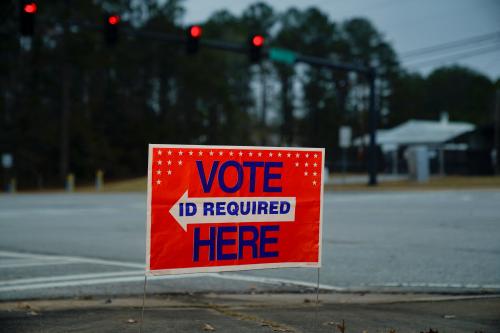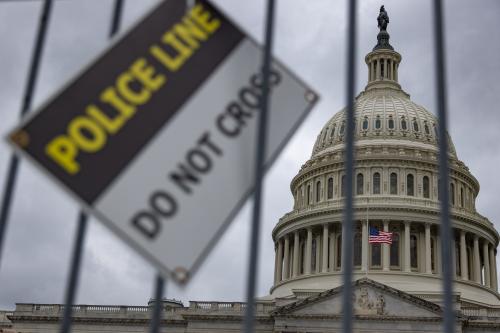On January 8, the Brookings Project for U.S. Relations with the Islamic World (IWR) convened a panel of Middle East scholars and political experts to discuss American views on the campaign against the Islamic State in Iraq and Syria (ISIS). The analysis centered on the findings of a two-part poll uncovering American perspectives on Middle East conflicts conducted by Shibley Telhami, a Brookings nonresident senior fellow and University of Maryland professor.
The poll, fielded in November 2014, revealed a degree of American skepticism towards U.S. engagement in the Israeli-Palestinian conflict, and towards any potential U.S. escalation of efforts against ISIS and the Asad regime in Syria. Tamara Cofman Wittes, director of Brookings’ Center for Middle East Policy, moderated a discussion featuring Telhami, E.J. Dionne, senior fellow with Brookings’ Governance Studies, and Susan Glasser, the editor of Politico.
The panelists analyzed what the poll identified as ambivalence amongst the American people about the anti-ISIS struggle, highlighted by the fact that 57 percent of Americans oppose sending ground troops to fight ISIS, while 57 percent also think the U.S. should intervene against ISIS at the “necessary level” to defeat the group. While most Americans rank ISIS as the United States’ most serious threat in the Middle East, there are many who still struggle with what the level of US involvement should be in the conflict.
The panelists suggested that these contradictory opinions could be the result of an “Iraq hangover”, or the prevailing war-weariness after more than a decade of U.S. military operations in Iraq and Afghanistan. Indeed, the poll findings suggested that only one-fifth of Americans think that the U.S. can actually defeat ISIS and ensure that they, or a group like them, would not return after U.S. military operations cease. To add to this ambivalence, Glasser suggested that the relatively modest level of U.S. military action against ISIS, and its modest result, only intensifies public cynicism. The hard lessons of Iraq and Afghanistan have apparently reinforced Americans’ reluctance to engage ground forces in conflicts of indeterminate length, even though most Americans sympathize with the anti-ISIS cause.
Telhami argued that Americans often base their support for foreign military intervention on the prospects for success and their perception of imminent domestic threats. Thus, even when Americans had more faith in U.S. global power — as in the immediate post-Cold War era — support for intervention was tepid in the absence of an immediate threat. Telhami cited the poll’s finding that many Americans conflate ISIS with Al Qaeda; among those who would favor sending ground forces to fight ISIS, the most popular justification was that ISIS is an extension of Al Qaeda, with whom we are still in a war that must be finished.
Yet the poll findings indicate that most Americans have at least some fear of an ISIS attack on American soil, public concerns about Americans joining ISIS are still less than concerns that Americans will join Al Qaeda. Dionne suggested that, in that light, it’s possible the poll might have yielded different results had it been conducted after last week’s Paris attacks.
The speakers also discussed the implications of American views of ISIS for domestic politics. Dionne argued that the ideological fissures between interventionist and isolationist worldviews within the Republican Party are deepening, and the anti-ISIS fight exacerbates these tensions. Telhami pointed to a parallel ideological gap between the grassroots and leadership of the Democratic Party. For example, he noted, the poll indicated that 42 percent of Democrats concern with the Israeli-Palestinian conflict is motivated by a concern with protecting human rights; that stance may be at odds with the Democratic leadership’s approach to the issue.
Wittes pointed out that Obama’s foreign policy reflects the public’s deep ambivalence towards the United States’ international role. The administration’s foreign policy has been shaped by a keen sense of the limits of U.S. capacity, particularly in the use of force, that is derived from the Iraq and Afghanistan wars. This is reinforced by, and reinforces, public perceptions that the United States is a benign, yet at times incapable, international actor. Dionne attributed this ambivalence to a paradoxical desire amongst Americans for global order without military engagement; Americans dislike military intervention, but also see no alternative to American leadership. In light of the evident fissures in both parties — and the ambivalence within the public — over America’s global role, panelists agreed that foreign policy could play a more significant role than usual in the 2016 presidential elections.



Commentary
Ambivalent Warriors: What Americans Think About the Fight Against ISIS
January 15, 2015